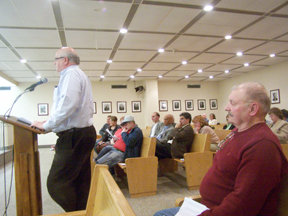The March 18 public hearing on the city’s proposed $133 million 2010 municipal budget was punctuated with comments from people running for political office.
Some were seeking to punch holes in the administration’s claim that they can spend $10 million more this year than last year and still not impose a tax increase on the citizens. Political candidates who spoke at the public hearing warned that the city could expect a massive tax increase next year.
Yet as dire as these predictions were, the biggest concern was about the method the city intended to use to hold down taxes this year and to make up for the fact that the city is spending millions more than it is bringing in as revenue.
“In some cases we’re doing more with less, and some cases we have to do without.” – Mayor Mark Smith
________
“[This] budget as introduced called for zero increase in the local property tax bill,” said Terrence Malloy, chief financial officer for the city, during the meeting. “Although there will be further amendments to the budget, the administration is fully committed to keeping the impact at zero.”
Why spending is up
This budget includes the city’s full annual obligation for municipal employee pensions for the first time since 2001, since the state allowed cities to defer these payments or portions of them in prior years. It also provides insurance obligations for employee health benefits and other insurance costs.
The increases, Malloy said, were offset by several items, including a change in the city’s prescription drug plan that saves the city $2 million. The city also reduced its work force from 882 in 2007 to 697 this year, and the city consolidated its municipal departments from eight to four, he said.
Mayor Mark Smith said these changes required some tough choices, but that there were no quick fixes. He called it a day-by-day, week-by-week fight to accomplish these cuts.
“In some cases, we’re doing more with less. In some cases, we have to do without,” he said. “My administration inherited a mess, and I believe we have made progress through hard work.”
He said this year’s budget does anticipate $28 million from the sale the Harbor Station section of the former Military Ocean Terminal to a private developer for development of a new mall, two hotels, and some residential housing.
Candidates criticize
John Budnick, a candidate for an at-large council seat in May, said he was puzzled about how the budget could rise $10 million and still not cause a tax increase.
“Does this mean that we’re going to get an increase after the election is over?” he asked.
Malloy said this budget impacts the current year, but after the meeting said he did not anticipate a tax increase in the early part of next year’s budget either.
Debra Noble, a candidate for the 3rd Ward council seat, asked about the policies regarding which employees get city cellular phones and 24-hour use of city vehicles.
Councilman Terrence Ruane said she made a valid point, and that the mayor’s office is currently reviewing policies.
Assemblyman Anthony Chiappone, who is running for mayor, raised questions about the governor’s taking of funds for city Urban Enterprise Zones (urban business districts), saying that the city is likely to get stuck with additional salaries for the 12 firefighters, seven police officers, and nine departments of Public Works people currently paid for by the UEZ.
Chiappone said he was also concerned about the city’s anticipating $28 million in this year’s budget from the sale of Harbor Station, saying that the city should have the contract done before the city uses the money. In 2006, Chiappone, then councilman, had raised similar concerns and was proven right when one of the developers pulled out of the deal at the last minute and put the city budget into default.
More questions
Mary Jane Desmond, who is running for the City Council, asked if the city has another plan in case the deal falls through. She also pressed for details on who the principals are in the company seeking to purchase the property.
City Attorney Charles D’Amico said because the matter is in negotiation, the city will not release information regarding the company or the deal itself.
Tom Bragen, who is also running for council, asked when these one-shot deals will stop.
Councilman Gary LaPelusa said the city has made progress in reducing its dependence on such deals. He said that five years ago, the city had a five year plan that would have called for the use of $25 million in land sales every year, plus a 6 percent tax increase. The plan was modified later so that not only did the city use less money from land sales in subsequent years, but took no money at all over the last two years.
Stan Marko, a resident of the 2nd Ward, asked about the sale and whether or not the city was cleared by the U.S. Army – former owner of the military base – to use the money. The city was previously under a restriction that it could not use the money from MOTBY land sales except to build roads, sewerage systems and other improvements that aided redevelopment.
Leonard Kantor, also a candidate for mayor, asked about the surplus from last year, which is being used to balance this year’s budget. He also raised concerns about the large part of this budget – $53 million – going to wages and salaries, and $25 million for debt payments.
